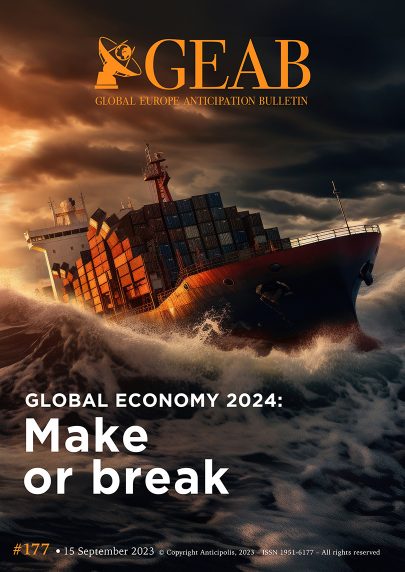GEAB 177

The diplomatic return revealed a clear advantage for the Global South in the concert of nations, marked by the BRICS summit in the first place, announcing an expansion to six new countries: Saudi Arabia, Egypt, the United Arab Emirates (UAE), Ethiopia, Iran and Argentina[1]. This decision demonstrates the confidence these countries have in their own power and in the stability and effectiveness of their institutions.
Immediately afterwards, they demonstrated the legitimacy of this confidence by directing the joint declaration issued by the G20 in their favour. This text received the unanimous support of the member countries, including China and Russia, alluding to Ukraine without openly condemning the Kremlin[2].
The conclusion that our team draws from this shock sequence is that the multipolar world is not only moving towards those who have shaped it, namely the BRICS and their partners in the Global South, but that they now have the capacity to drag other countries and regions in their wake, starting with the Middle East, closely followed by Africa. The expansion of the BRICS demonstrates not only the extent of an economic power to be harnessed (see our Economic Panorama in this same issue), but also a geopolitical and therefore diplomatic power of which the G20 summit was only a foretaste. This new pace allows us to anticipate the next diplomatic paths that these countries will impose on the previous war/peace makers: the US and the EU.
After war comes peace, as after rain comes fair weather. We therefore anticipate a proliferation of negotiation commitments in the world’s various conflict zones, which we will review here in a non-exhaustive manner.
The selection of BRICS+ candidates
Nearly thirty countries have expressed a desire to join the bloc, and six have been selected and invited to join, an invitation they must accept by the end of the year. Unlike the EU, the BRICS have not made their integration criteria and process public. It is therefore understandable that they have done so on a case-by-case basis. Therefore, the next diplomatic sequence in the short term will be with and between the new BRICS members. This sequence has already been initiated by Egypt and Ethiopia, which have started negotiations on the Renaissance Dam project[3]. For several years, the two countries have been embroiled in a dispute over the construction of this dam on the Nile. This pharaonic project, launched by Ethiopia in 2011 and now finally completed, is presented as vital for the country, and denounced as a threat by Egypt and Sudan, who fear it will reduce their access to the river water[4]. Egypt has complained about Ethiopia’s unilateral action in this context, and the BRICS will be able to provide the missing framework for the two countries to reach a compromise (see our trend article “Africa, the last pawn on the global multipolar chessboard” in this same issue).
Iran and Saudi Arabia, long-time enemies, are in a similar situation[5]. A normalisation of relations, which is already underway, could be pursued with the help of the other BRICS states, including the UAE as a mediator. As in the case of relations between these two countries and the SCO (Shanghai Cooperation Organization)[6], Iran has a greater interest in this integration than Saudi Arabia, which is why Tehran was so enthusiastic at the end of the summit[7], whereas Riyadh is more moderate[8], given the internal difficulties that Iran has been experiencing for several months now. In addition to these, the Iranian nuclear issue has constrained the country’s international relations for too long now, and access to an international institution such as the BRICS, which manages to challenge the West while maintaining its credentials, is too good an opportunity to pass up (the strategic importance of the region represents an invaluable asset for any kind of alliance, see our trend article “The Middle East pivot” in this issue). Iran will therefore undoubtedly be more flexible and more open to discussions with Saudi Arabia, which should lead it to make concessions on Israel.
This rapprochement is in line with our long-held anticipation[9] of the creation of a Middle East 3.0. This anticipation described the great transition initiated by Saudi Arabia (and now completed), for which the country needs peace in the region to transform its political regime as well as its economy. To complete this undertaking and embrace the ambitious future outlined by the government (embodied by NEOM and The Line project[10]), all that is needed now is to normalise relations with Iran and finally make peace with Israel.
A Power able to see forward
Beyond the diplomatic challenges directly affecting its future members, the BRICS+ will represent a power with the capacity to project itself across the globe. First in Africa, where the proliferation of coups should be seen as a first step towards stabilisation. The situation in the Sahel can be seen as a magnifying mirror of the global geopolitical recomposition (rebalancing of international power, “neo-sovereignism”, definition of an autonomous foreign policy)[11]. This phase of stabilisation, which France has rejected, cannot be achieved without the support of partners: China for its economic influence through its substantial direct investments; and Russia for its indirect military support through the influence of the Wagner group (now back under Kremlin control following the failed coup of its leader, Prigogine).
Secondly, in Latin America, where Brazil and Argentina are the two main powers that could form the leading force in the subcontinent (apart from Mexico, which is closer to North America, notably through NAFTA). Here too, the BRICS could provide an additional framework for negotiations capable of supporting the desire of these two countries to increase their interdependence[12], within the subcontinent itself, with projects such as the common currency “Sur”[13]; but also by welcoming Chinese investment and very probably without rejecting relations with the United States altogether.
Login

Everyone knows that what doesn't bend, breaks. This is the short-term threat to the European Union's economy. The supranational operation of its institutions is inflexible, and in the international economic [...]
The political landscape of the European Union is undergoing a paradoxical reconfiguration: ideas from the right, and even more so from the far right, are on the rise; yet the [...]
Adrien Hubert works in international cryptocurrency and Web3 circles more generally. He has set up several companies, including Geminy, of which he is CEO. He gives us his views, based [...]
Africa, the last pawn on the global multipolar chessboard Egypt, Ethiopia, South Africa: Africa's BRICS axis is more oriented towards the East, although it should be noted that Addis Ababa, [...]
Cheap oil is history As demonstrated in our economic panorama, oil prices will remain high in the short and medium term, driven mainly by the coordinated action of Russia and [...]

Comments